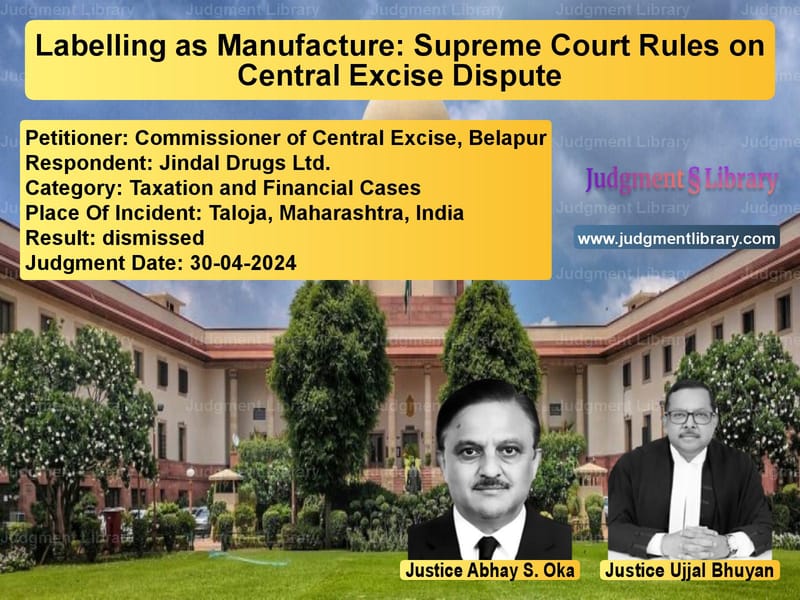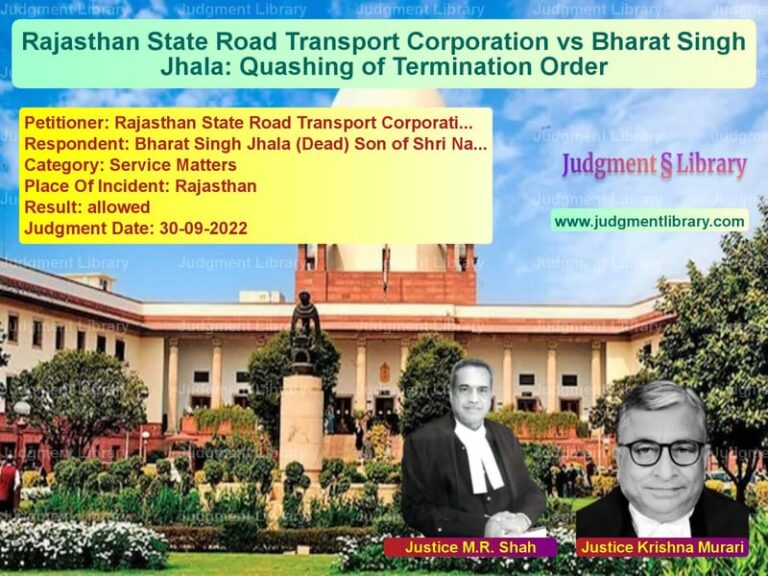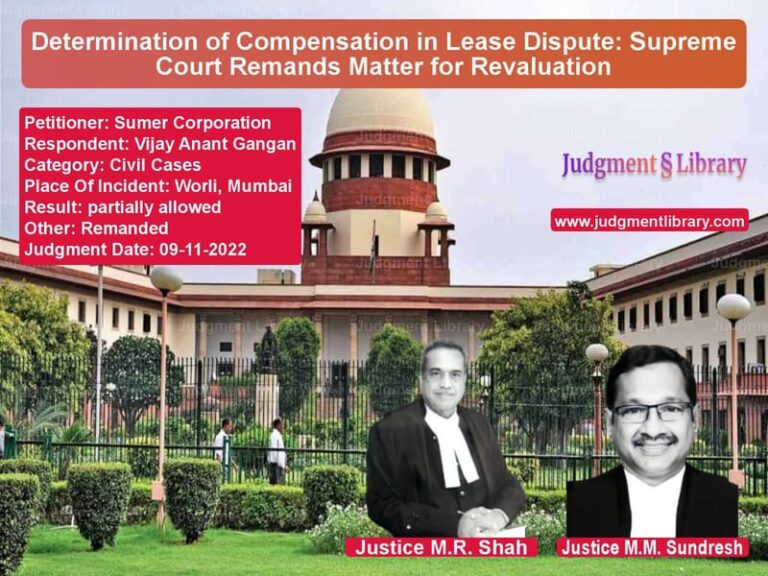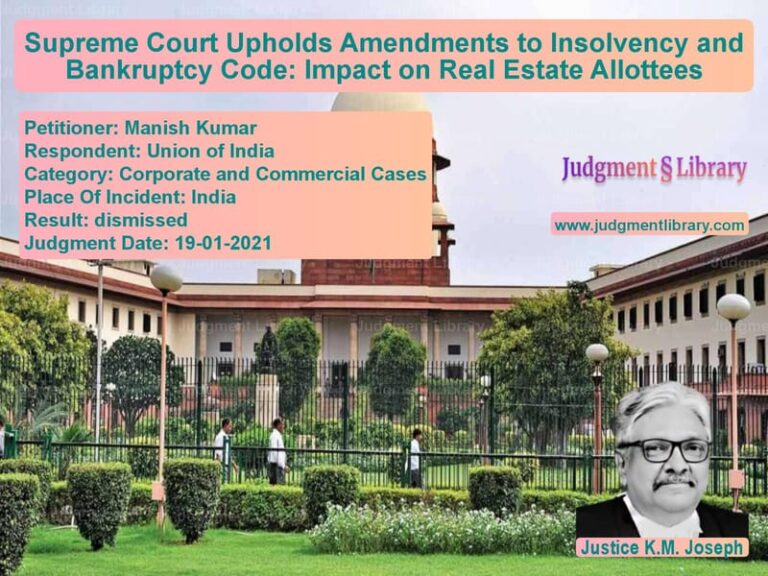Labelling as Manufacture: Supreme Court Rules on Central Excise Dispute
The Supreme Court of India has ruled in favor of Jindal Drugs Ltd. in a dispute concerning whether labelling and re-labelling of imported and domestically manufactured cocoa products at its Taloja unit constituted ‘manufacture’ under the Central Excise Act, 1944. The case, Commissioner of Central Excise, Belapur vs. Jindal Drugs Ltd., addressed the interpretation of Note 3 to Chapter 18 of the Central Excise Tariff Act, 1985, which defines what activities constitute ‘manufacture’.
Background of the Case
The appellant, Commissioner of Central Excise, Belapur, challenged the decision of the Customs, Excise, and Service Tax Appellate Tribunal (CESTAT), which had ruled in favor of Jindal Drugs Ltd. The dispute revolved around whether Jindal Drugs’ activity of affixing labels on cocoa butter and cocoa powder at its Taloja unit amounted to ‘manufacture’ under excise laws, thereby allowing it to claim CENVAT credit and export rebates.
The revenue authority had demanded the reversal of CENVAT credit worth Rs. 23.02 crore and a refund of the Rs. 13.22 crore rebate granted to Jindal Drugs on the grounds that labelling did not amount to manufacture.
Arguments by the Petitioner (Commissioner of Central Excise, Belapur)
- The appellant argued that affixing labels on cartons of cocoa butter and cocoa powder did not enhance their marketability and thus could not be considered ‘manufacture.’
- Under Note 3 to Chapter 18 of the Central Excise Tariff Act, 1985, ‘manufacture’ occurs when an activity significantly alters the marketability of a product.
- Jindal Drugs was allegedly misusing the provisions by claiming CENVAT credit on the goods received from its Jammu unit, which were later labelled and exported.
- The company had failed to disclose to the revenue department that the Taloja unit’s activities were limited to mere labelling, thus engaging in suppression of facts.
Arguments by the Respondent (Jindal Drugs Ltd.)
- The company argued that the activity of labelling was clearly covered under the definition of ‘manufacture’ as per Note 3 to Chapter 18, which was amended in 2008.
- Post-2008, the amendment replaced ‘and’ with ‘or’, making it clear that any of the specified activities—labelling, re-labelling, repacking, or adoption of other treatments—would amount to ‘manufacture.’
- The Taloja unit and the Jammu unit were separate legal entities, and the company was entitled to claim CENVAT credit for duty paid at the Jammu unit.
- There was no suppression of facts, as all activities were duly reported to the authorities.
Supreme Court’s Judgment
The Supreme Court dismissed the appeal filed by the revenue authority and upheld the CESTAT’s decision in favor of Jindal Drugs.
Key Observations
- The Court held that the amendment to Note 3 to Chapter 18 was crucial in determining the case. Post-2008, labelling or re-labelling alone, without repacking, constituted ‘manufacture.’
- It reaffirmed that excise duty laws should be interpreted in accordance with statutory amendments, and the revised definition applied in this case.
- The CESTAT’s majority decision, which found that Jindal Drugs’ activities at Taloja amounted to ‘manufacture,’ was legally sound.
- Since the activities were deemed as ‘manufacture,’ the company was eligible to claim CENVAT credit and the rebates provided under law.
Final Order
- The Supreme Court upheld CESTAT’s ruling and dismissed the appeal.
- The demand for reversal of Rs. 23.02 crore in CENVAT credit and Rs. 13.22 crore in export rebates was quashed.
- The Court confirmed that Jindal Drugs had not suppressed facts or engaged in fraudulent practices.
Legal Implications of the Judgment
This ruling has significant implications for excise taxation and the interpretation of ‘manufacture’ under the Central Excise Tariff Act:
- Expanded scope of manufacture: Labelling or re-labelling alone, without repacking, is sufficient to constitute ‘manufacture’ in excise law.
- Clarity on CENVAT credit: Manufacturers with multiple units can claim CENVAT credit if their activities comply with statutory definitions.
- Strengthened legal precedent: Businesses engaged in similar labelling activities can rely on this ruling to claim excise benefits.
- Protection against arbitrary tax claims: The ruling prevents tax authorities from demanding duty reversals without legal justification.
Conclusion
The Supreme Court’s decision in Commissioner of Central Excise, Belapur vs. Jindal Drugs Ltd. clarifies the definition of ‘manufacture’ under excise laws. By upholding the revised statutory language in Note 3 to Chapter 18, the Court has ensured that businesses engaged in labelling activities can claim excise benefits without fear of unwarranted tax demands. This judgment sets a crucial precedent for future disputes concerning excise taxation and CENVAT credit.
Petitioner Name: Commissioner of Central Excise, Belapur.Respondent Name: Jindal Drugs Ltd..Judgment By: Justice Abhay S. Oka, Justice Ujjal Bhuyan.Place Of Incident: Taloja, Maharashtra, India.Judgment Date: 30-04-2024.
Don’t miss out on the full details! Download the complete judgment in PDF format below and gain valuable insights instantly!
Download Judgment: commissioner-of-cent-vs-jindal-drugs-ltd.-supreme-court-of-india-judgment-dated-30-04-2024.pdf
Directly Download Judgment: Directly download this Judgment
See all petitions in Tax Refund Disputes
See all petitions in Customs and Excise
See all petitions in GST Law
See all petitions in Judgment by Abhay S. Oka
See all petitions in Judgment by Ujjal Bhuyan
See all petitions in dismissed
See all petitions in supreme court of India judgments April 2024
See all petitions in 2024 judgments
See all posts in Taxation and Financial Cases Category
See all allowed petitions in Taxation and Financial Cases Category
See all Dismissed petitions in Taxation and Financial Cases Category
See all partially allowed petitions in Taxation and Financial Cases Category







